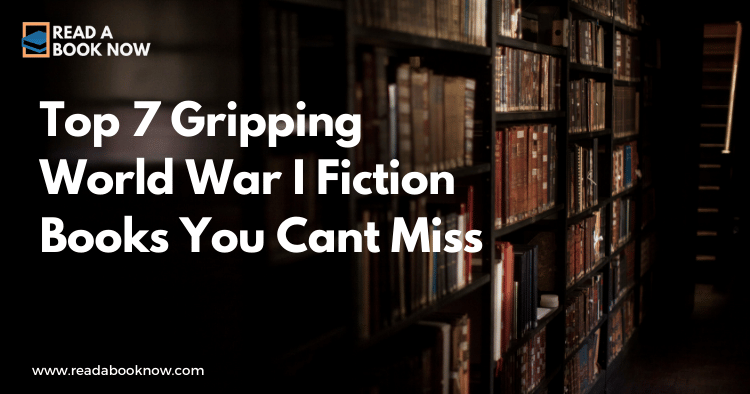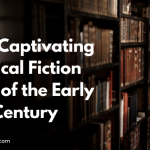Table of Contents
- Introduction
- 1. All Quiet on the Western Front by Erich Maria Remarque
- 2. A Farewell to Arms by Ernest Hemingway
- 3. The Regeneration Trilogy by Pat Barker
- 4. Birdsong by Sebastian Faulks
- 5. The Wars by Timothy Findley
- 6. Private Peaceful by Michael Morpurgo
- 7. The First World War by John Keegan
- Conclusion
- FAQs
Introduction
World War I was a cataclysmic event that reshaped the globe and left an indelible mark on literature. Fictional works set against this backdrop offer profound insights into the human condition, bravery, and the profound impacts of war. In this article, we’ll explore seven gripping novels that not only depict the harrowing experiences of soldiers but also delve into the emotional and psychological ramifications of the war. Whether you’re a history buff or just looking for a compelling read, these titles are sure to captivate your imagination.
“Literature has the power to transport us to times and places far removed from our own, allowing us to understand the struggles and triumphs of those who came before us.”
1. All Quiet on the Western Front by Erich Maria Remarque
Overview: Published in 1929, Remarque’s seminal work is often regarded as the definitive novel of World War I. It follows a group of German soldiers as they navigate the brutal realities of trench warfare.
Key Themes:
- The Horrors of War: The novel starkly portrays the physical and psychological trauma endured by soldiers.
- Loss of Innocence: It showcases how young men, filled with patriotic fervor, are transformed by the grim realities of combat.
Why You Can’t Miss It:
Remarque’s powerful prose and firsthand experiences lend authenticity to the narrative. It’s a poignant reminder of the sacrifices made during the war and continues to resonate with readers today.
Read more about Erich Maria Remarque’s impact on literature.
2. A Farewell to Arms by Ernest Hemingway
Overview: This 1929 novel is a semi-autobiographical account of Hemingway’s own experiences as an ambulance driver in Italy during World War I.
Key Themes:
- Love and Loss: The romance between Frederick Henry and Catherine Barkley unfolds amidst the chaos of war, highlighting the fragility of human relationships.
- The Futility of War: Hemingway’s stark, minimalist style emphasizes the senselessness of conflict.
Why You Can’t Miss It:
Hemingway’s unique narrative style and exploration of love amid war make this novel a timeless classic. It’s celebrated for its emotional depth and raw honesty.
Learn more about Hemingway’s writing style and themes.
3. The Regeneration Trilogy by Pat Barker
Overview: This trilogy includes “Regeneration,” “The Eye in the Door,” and “The Ghost Road,” and it explores the psychological effects of war on soldiers.
Key Themes:
- Mental Health: Focuses on the treatment of soldiers suffering from PTSD (then known as shell shock).
- Historical Figures: The series features real historical figures like Wilfred Owen and Siegfried Sassoon.
Why You Can’t Miss It:
Barker’s exploration of mental health in soldiers was groundbreaking and remains relevant. The trilogy’s blend of fiction and historical reality provides a rich reading experience.
Discover more about Pat Barker and her works.
4. Birdsong by Sebastian Faulks
Overview: This novel spans generations, primarily focusing on the experiences of Stephen Wraysford, who fights in the trenches of the Somme.
Key Themes:
- Love and Memory: The story intertwines themes of love and loss, emphasizing how memories of love can endure even in the darkest times.
- The Brutality of War: Faulks doesn’t shy away from the graphic realities of trench warfare.
Why You Can’t Miss It:
Faulks’ lyrical prose and deep character development make “Birdsong” a haunting exploration of war and its aftermath. It’s a must-read for those who appreciate rich storytelling.
Explore the themes of love and war in “Birdsong.”
5. The Wars by Timothy Findley
Overview: This novel tells the story of Robert Ross, a young Canadian soldier, and his transformation during the war.
Key Themes:
- The Loss of Innocence: The narrative captures the transition from youth to the harsh realities of adulthood through war.
- Nature vs. War: Findley contrasts the beauty of the natural world with the horrors of human conflict.
Why You Can’t Miss It:
Findley’s poetic writing style and the exploration of the psychological impacts of war make “The Wars” a poignant and thought-provoking read.
Learn more about Timothy Findley and his literary contributions.
6. Private Peaceful by Michael Morpurgo
Overview: Aimed at younger readers, this novel tells the story of Thomas Peaceful, a soldier reflecting on his childhood and experiences in the war.
Key Themes:
- Childhood and Innocence: Morpurgo highlights the loss of childhood innocence through the lens of war.
- Brotherhood: The bond between brothers and friends is a central theme that emphasizes loyalty and sacrifice.
Why You Can’t Miss It:
Morpurgo’s ability to address serious themes in an accessible way makes this book an invaluable read for both young adults and adults alike.
Check out Michael Morpurgo’s other works.
7. The First World War by John Keegan
Overview: While technically a non-fiction book, Keegan’s narrative offers a comprehensive analysis of World War I, blending historical facts with personal accounts.
Key Themes:
- Historical Context: Provides a detailed examination of the causes and effects of the war.
- Personal Narratives: Keegan incorporates firsthand accounts that bring the history to life.
Why You Can’t Miss It:
This book is crucial for understanding the broader context of the war and serves as an excellent companion piece to the fictional narratives.
Explore more about John Keegan’s contributions to military history.
Conclusion
World War I fiction offers readers a profound exploration of the human experience during one of history’s most tumultuous periods. Each of these novels not only entertains but also educates, providing insights into the sacrifices of those who lived through the war. Whether you’re revisiting a classic or discovering a new favorite, these titles are sure to leave a lasting impression.
“Through stories, we connect with the past, forging a deeper understanding of the struggles that shaped our world.”
FAQs
Q: What is the significance of World War I fiction?
A: World War I fiction captures the emotional and psychological experiences of soldiers and civilians, illustrating the profound impacts of war on humanity.
Q: Are there any other genres that explore World War I?
A: Yes, there are numerous biographies, memoirs, and historical analyses that delve into the war’s events and its aftermath.
Q: Can these books be suitable for young adults?
A: Many of the listed titles, like “Private Peaceful,” are accessible and appropriate for young adult readers, often addressing themes of courage, loss, and friendship.
“Reading is not just an escape; it’s a journey into the hearts and minds of those who lived before us.”
Feel free to dive into these narratives, and let the stories of resilience and bravery inspire you!
Also look for: If you’re interested in further exploring literature that delves into historical themes, check out 10 Must-Read 19th Century Classics for Every Book Lover or 10 Essential Modern American Classics You Must Read Now.



